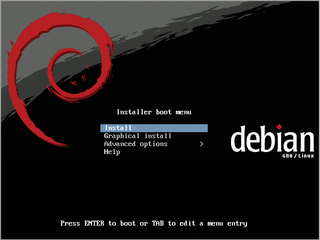
The iconic Debian Project has long been a Linux leader. As the world's biggest and most popular community distro, Debian is built by a worldwide army of hundreds of developers. The focus is on freedom: Debian is 100% free software, with no proprietary applications or drivers. And Debian is stable. The long release cycles and thorough testing processes are reasons why this volunteer distro serves as a source for dozens of other Linux projects. The comprehensive testing system means that major Debian releases are typically so far apart that seasoned Debian watchers make a point of checking the progress at intermediate moments. We are proud to bring you the July 7, 2008, Debian 5.0 Lenny "testing" version as this month's Linux Magazine DVD.
Debian 5.0 Lenny comes with Linux kernel 2.6.24, and you'll find new and improved features throughout the vast Debian application set. Write to NTFS partitions with ntfs-3g. Monitor your network with Nagios 3. The Gnome 2.22 desktop rolls out several useful new features, such as native Flash support and automatic configuration of hotplug printers, offering improvements to applications such as the Evolution mail and calendaring client, the Evince document viewer, the Totem movie player, and the Network-manager and Power-Manager admin utilities. Also included with Debian 5.0 are X.org 7.3, OpenOffice 2.4, Gimp 2.4, and Inkscape 0.46, as well as the Iceweasel 2.0 web browser (Debian's all-free version of Firefox).
Debian veterans remember long installations with geeks-only utilities and text-based installers, but recent Debian versions have come with a simple yet sophisticated graphical installer. The Debian 5.0 installer includes several improvements, making Debian as easy to install and configure as an ordinary desktop system. New features include a new boot menu, better language support, improved mouse configuration, and support for encrypted partitions.
Debian's Apt package system provides a simple and reliable structure for installing and managing software. Either install the packages easily from the command line, or use one of the many GUI-based tools designed for managing Debian packages.
This single DVD will help you get started with Debian on a 32-bit or 64-bit Intel or equivalent system. If you slip the disc in your drive, you'll find an easy installer with improved hardware detection. The package system will help you keep current and find the applications you need. We hope you enjoy this month's Debian Lenny DVD.
| Supported Hardware |
|
Intel 386: Lenny needs at least a 486 Pentium or compatible CPU by AMD or VIA, an Athlon XP, or a P4 Xeon. AMD64: Standard computer with the AMD 64-bit extension or Intel EM64T. The Debian installer requires a minimum of 64MB of memory and 500MB of disk space. Debian recommends 256MB of memory and a 1GB hard drive for a text-based system or 512MB of memory with a 5GB hard drive for a desktop system. |
| Double-Sided DVD |
|
This month's Debian DVD is a double-sided disc, with a 32-bit version on one side and a 64-bit version on the other. DVD devices already read the side of the disc that is facing down. This disc is labeled like a normal DVD - the label you see as you place the disc into the tray applies to the data on the opposite side. For example, if you are installing the 32-bit version, the 32-bit label should be facing up in the tray. |
| Help & Support |
|
For questions about Debian installation, see the Debian Installation Guide http://www.debian.org/releases/testing/installmanual. Also, you will find useful information at the Debian forums http://forums.debian.net/ and the Debian wiki http://wiki.debian.org/. |
| Highlights |
|
Linux kernel 2.6.24 Gnome 2.22 KDE 3.5.9 X.org 7.3 glibc 2.7 OpenOffice 2.4 Iceweasel 2.0 (based on Firefox) Icedove 2.0 (based on Thunderbird) GIMP 2.4 Gaim 2.0.0 GStreamer 0.10 Qemu 0.9.1 Apache 2.2.9 Samba 3.0.30 Sendmail 8.14.3 MySQL 5.0 PostgreSQL 8.3 Synaptic 0.62 Perl 5.10 Python 2.5 PHP 5.2.5 |
| Additional Resources |
|
[1] Debian Project: www.debian.org [2] Debian GNU/Linux FAQ: http://www.debian.org/doc/manuals/debian-faq/ [3] What is Debian GNU/Linux? http://www.debian.org/releases/testing/i386/ch01s03.html.en |